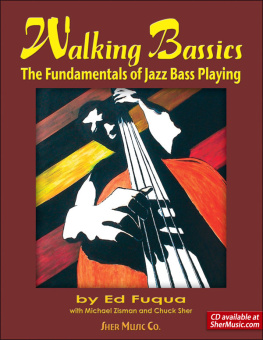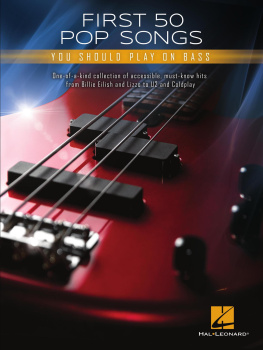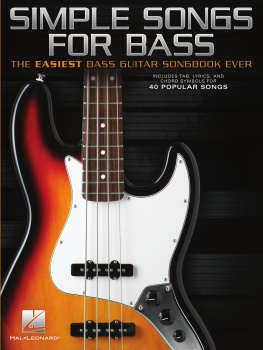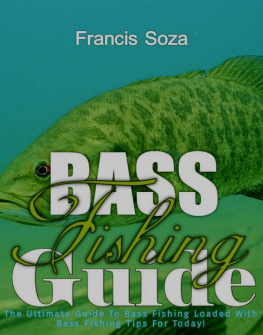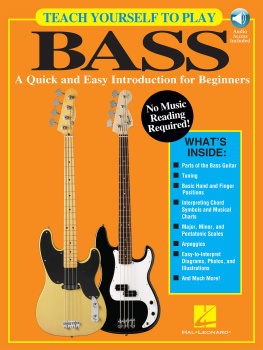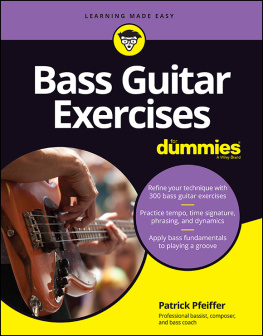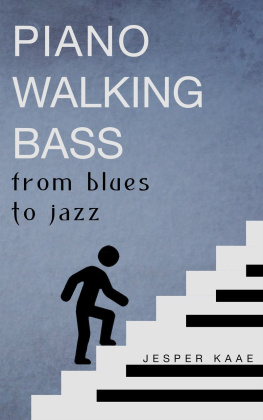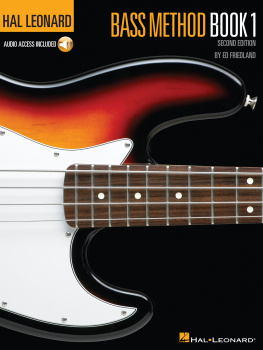Ed Fuqua - Walking Bassics
Here you can read online Ed Fuqua - Walking Bassics full text of the book (entire story) in english for free. Download pdf and epub, get meaning, cover and reviews about this ebook. year: 2008, publisher: Sher Music Co, genre: Children. Description of the work, (preface) as well as reviews are available. Best literature library LitArk.com created for fans of good reading and offers a wide selection of genres:
Romance novel
Science fiction
Adventure
Detective
Science
History
Home and family
Prose
Art
Politics
Computer
Non-fiction
Religion
Business
Children
Humor
Choose a favorite category and find really read worthwhile books. Enjoy immersion in the world of imagination, feel the emotions of the characters or learn something new for yourself, make an fascinating discovery.
- Book:Walking Bassics
- Author:
- Publisher:Sher Music Co
- Genre:
- Year:2008
- Rating:5 / 5
- Favourites:Add to favourites
- Your mark:
- 100
- 1
- 2
- 3
- 4
- 5
Walking Bassics: summary, description and annotation
We offer to read an annotation, description, summary or preface (depends on what the author of the book "Walking Bassics" wrote himself). If you haven't found the necessary information about the book — write in the comments, we will try to find it.
Walking Bassics — read online for free the complete book (whole text) full work
Below is the text of the book, divided by pages. System saving the place of the last page read, allows you to conveniently read the book "Walking Bassics" online for free, without having to search again every time where you left off. Put a bookmark, and you can go to the page where you finished reading at any time.
Font size:
Interval:
Bookmark:
Thoughtfully conceived, informative, concise, and organized with the needs of the young musician in mind.
EDDIE GOMEZ
(bassist with Bill Evans, Chick Corea, etc.)
I found this book to be a really well-planned, in-depth and articulate study of the walking bass concept. I recommend this book for those who are searching for the right answers on how to create a strong, solid and confident walking bass line. I am now personally excited to schedule Walking Bassics into my own study rotation.
JIMMY HASLIP
(bassist with Yellowjackets, Alan Holdsworth, etc.)
This is a simple yet thorough book on beginning bass lines. Music is all about group interplay and most accomplished modern improvisers see a performance as a conversation. This book gives beginning musicians some of the basic tools they need to get into that kind of conversation on a deep level.
BEN ALLISON
(bassist and Palmetto Records recording artist)
I call the bass line the bass melody. It is a really important area for all bass players to dig deep into. Ed Fuquas book is an important edition to the jazz pedagogy for bass players. I highly recommend it.
MEL GRAVES
(bassist with Denny Zeitlin, Mose Allison, etc.
Head of Sonoma State Univ. Jazz Dept.)
Wonderful job! For the past several years I have been teaching private bass lessons at the La Guardia High School for the Performing Arts. I have been going over these exact ideas, but you have really organized these basic, and incredibly IMPORTANT, concepts into an orderly and easy to understand system. A great idea!
NEAL MINER
(bassist with Jon Hendricks, Annie Ross, etc.)
Provides the aspiring jazz bassist with a thorough guide to walking bass lines. An in-depth look at the heart and soul of jazz bass playing.
JOHN GOLDSBY
(bassist, author and jazz educator)
and Chuck Sher
Chuck Sher - Editor and publisher
Larry Dunlap - Music transcribing
Chuck Gee - Music engraving
Attila Nagy - Cover design and graphics
Cover Art Bassically Blue by Todd Horne
()
All Rights Reserved. International Copyright Secured. Made in the U.S.A.
No part of this book or audio CD may be reproduced in any form
without written permission from the publisher.
ISBN 1-883217-50-4
copying or distribution of any kind of this digital book constitutes theft of
our intellectual property and is expressly prohibited without written
permission from the publisher.
at http://www.shermusic.com/new/downloads.shtml. See the left-hand sidebar of our home page.
The idea of this book is to give you a firm foundation in how to create swinging, supportive walking bass lines. In order to do that, we have transcribed every note that NY bassist Ed Fuqua plays on the accompanying CD. We suggest that you follow the following steps in order to get the most out of this book:
1. Listen to a track while watching the transcription go by. Notice Eds rock-solid sense of time, fat tone and rhythmic bouyancy.
2. Without the CD, play through the transcription yourself, slower than the recorded tempo if necessary, until you can play it without stopping.
3. Work up to the tempo of the recording and then try playing along with the CD. Try to imitate Eds sense of rhythmic propulsion and the supple sound of the notes. If the last few tracks are too fast for you to play up to tempo, just skips steps 3 & 4 for now.
4. Then try turning off the bass channel and playing along with the piano and drums yourself, using first the written notes and then making up your own lines.
Ed Fuqua is a young, but already seasoned veteran of the New York jazz scene, having performed with Clifford Jordan, Junior Mance, Pete Yellin, Leon Parker, Yoron Israel, Jimmy Lovelace, Bernard Purdie, Ron Afif, Doug Raney and Dakota Staton, among many others. He studied music at Augusta State University and the Berklee College Of Music, and privately with Joe Solomon, Lennie Tristanos bassist.
His discography includes:
The Jeff Silverbush Quintets Pojo and Grandma Mickey
The Jon Raney Trios Waltz For Talia
The Burt Eckoff Trios Ecology
The Charles Krachy Quartets Jazzmans Serenade
First and foremost, Id like to thank Chuck Sher for helping make this book possible. Since working together for the recording that accompanied Sher Music Co.s The Blues Scales: Essential Tools For Jazz Improvisation, he has been very encouraging and supportive. Id also like to thank Dan Greenblatt, for all the great music weve played together for the last five years and for bringing Chuck and I together. And many thanks to Michael Zisman for his cogent and insightful contributions to the text.
Much of what I talk about and play in this book is due to the work I have done with my teacher, Joe Solomon, for the last ten years. He was the one that gave me a way to see the path ahead. Thanks, Joe! Id also like to thank the musicians on the recordingDave Marck, Jon Easton and Chris Rosellifor their contributions. It was always swinging!
Last, but certainly not least, Id like to thank two people who meant so much to me when I started playing, lo those many years ago (and continue to do so to this day). Tommy Gulleyfriend, fellow bassist, jazz enthusiast and mentor. Ill always treasure the memory of being a callow youth on the bandstand with Tommy; hed play bass for a chorus, then Id play bass for a chorus, trying to match that propulsive swing and deep feeling. And my buddy, guitarist Matt Whittington, who uttered the fateful words to me as a young rock bass player, Hey, didja ever hear any Clifford Brown?
If youre a beginning bassist or even if you have some experience with other styles of music, playing jazz standards can be a scary proposition. Creating a walking bass line can seem almost too hard; it challenges your understanding of functional theory (what notes will work with these chords), your physical approach or technique (finding those notes on the fingerboard), and your ear (which notes will sound good). And to do all of that not only with the chord changes as composed, but also in answer to a soloists direction, and to drive a rhythm sectionwell, it can be almost overwhelming.
But dont despairyou hold in your hand a book that can give you the tools you need to build dynamic, propulsive, swinging, melodic walking bass lines that are yours, which you come up with on your own. The points well cover in order to learn how to create good walking bass lines are these:
1. Harmonic Propulsion - All we mean by this is playing so that there is a feeling of forward motion from one chord into the next in the harmonic progression. Although many jazz books and teachers base the swing feel on the correct phrasing of the eighth notes, we as bassists (in the context of a walking line) are dealing with quarter notes. And to give forward movement to a line, to the harmony, it is really important that your note choices move the music forward.
Harmonic Definition - Harmony means the chords, right? So harmonic definition must mean defining the chords. We bassists are the foundation of the harmony; whatever note we play can, in many situations, define and change how the harmony is heard or functions. The most basic way to define a chord is to arpeggiate it, which we will discuss in first section of the book.
Next pageFont size:
Interval:
Bookmark:
Similar books «Walking Bassics»
Look at similar books to Walking Bassics. We have selected literature similar in name and meaning in the hope of providing readers with more options to find new, interesting, not yet read works.
Discussion, reviews of the book Walking Bassics and just readers' own opinions. Leave your comments, write what you think about the work, its meaning or the main characters. Specify what exactly you liked and what you didn't like, and why you think so.

